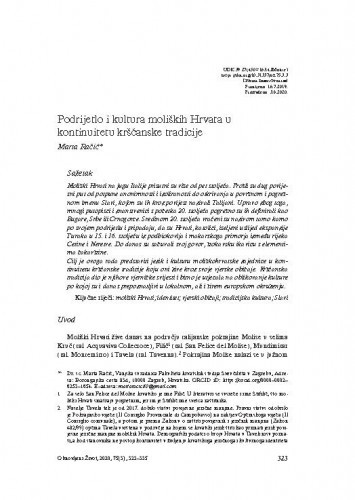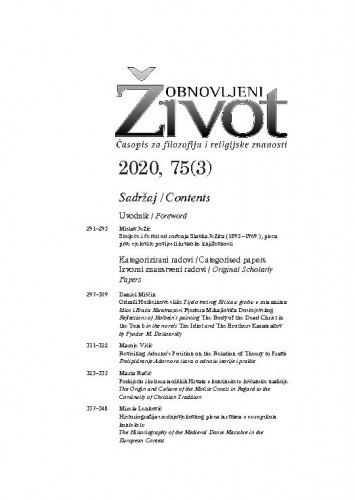Moliški Hrvati na jugu Italije prisutni su više od pet stoljeća. Prošli su dug povijesni put od potpune anonimnosti i izoliranosti do otkrivanja u površnom i pogrešnom imenu Slavi, kojim su ih kroz povijest nazivali Talijani. Upravo zbog toga, mnogi putopisci i znanstvenici s početka 20. stoljeća pogrešno su ih definirali kao Bugare, Srbe ili Crnogorce. Sredinom 20. stoljeća vraćeni su nazivom tamo kamo po svojem podrijetlu i pripadaju, da su Hrvati, katolici, iseljeni uslijed ekspanzije Turaka u 15. i 16. stoljeću iz podbiokovlja i makarskoga primorja između rijeka Cetine i Neretve. Do danas su sačuvali svoj govor, štokavsku ikavicu s elementima čakavštine.Cilj je ovoga rada predstaviti jezik i kulturu moliškohrvatske zajednice u kontinuitetu kršćanske tradicije koju oni žive kroz svoje vjerske običaje. Kršćanska tradicija dio je njihove vjerničke svijesti i bitno je utjecala na oblikovanje kulture po kojoj su i danas prepoznatljivi u lokalnom, ali i širem europskom okruženju.; The Molise Croats have been present in a region of southern Italy for more than five centuries, where they, despite natural assimilation processes, still live their linguistic and cultural identity in three Croatian villages in the Molise region. Since their arrival in Italy, they have undergone a difficult process beginning with complete anonymity and isolation leading up to false and ignorant or malevolent usurpation by travel writers or scientists, who often misinformed others about their identity, while themselves being wrongly informed about the term Slavi, as used by the Italians.Finally, in the middle of the 20th century, they were recognised for what they are, in fact, according to their origin, namely, Croatian Catholics who fled to Italy from the Ottoman invasions in the 15th and 16th centuries, leaving the area surrounding the Cetina and Neretva Rivers, the Podbiokovlje area and the Makarska Riviera which they inhabited.During this time–span they have succeeded in preserving their vernacular — the Štokavian–Ikavian dialect with elements of the Čakavian. This is a well–known fact about the Molise Croats, however, that which has always strongly characterised their community (but has seldom been mentioned) is their Christian tradition which has been an important factor in defining their identity.Religious traditions and the consistency of the people in living them are the result of their religious awareness which has significantly shaped their culture and which still renders them distinguishable in their local community.They are recognised as being different and linguistically isolated, but persistent in preserving and passing on true values which have been interwoven into their everyday lives and which have survived through the centuries in their poetry, customs, prayers as well in their weaving tradition, their cuisine and agriculture which together are representative of their rich cultural heritage.
Sažetak

 Obnovljeni život : časopis za religioznu kulturu : 75, 3(2020) / glavni urednik Tadija Milikić.
Obnovljeni život : časopis za religioznu kulturu : 75, 3(2020) / glavni urednik Tadija Milikić.